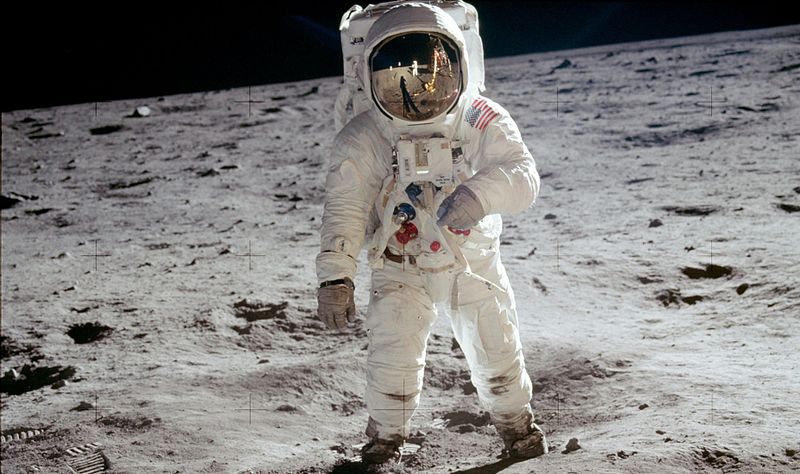At Popular Mechanics, Joe Pappalardo reminds us that the 50th anniversary of the Apollo 11 lunar landing is coming up next month, but that current developments in space are worth celebrating too:

Astronaut Buzz Aldrin, lunar module pilot, stands on the surface of the moon near the leg of the lunar module, Eagle, during the Apollo 11 moonwalk. Astronaut Neil Armstrong, mission commander, took this photograph with a 70mm lunar surface camera. While Armstrong and Aldrin descended in the lunar module to explore the Sea of Tranquility, astronaut Michael Collins, command module pilot, remained in lunar orbit with the Command and Service Module, Columbia.
Apollo was born of Cold War desperation: a political exercise that paid enormous scientific and technological dividends. After the launch of Sputnik in 1957, it became vital to beat the Soviet Union to the Moon, a geopolitical urge that created an enormous budgetary effort.
The problem with politically motivated — well, anything — is that the faucet of support can be closed just as quickly as it opened. It happened to Apollo, as follow on missions were cancelled and the focus shifted to a reusable craft to service low-earth orbit. This pattern of shifting space priorities and strategies whipsawed NASA, most noticeably when the Obama administration’s cancellation of the Bush-era Constellation moon program in 2010.
But multiple private companies pursuing their niches in space have an obvious redundancy. While companies may rise and fall, the very nature of a commercial effort isn’t as dependent on government funding. If it’s worth doing, especially if it makes money, space industry will endure political shifts. The objectives of a well-run company do not change that much every four years.
That leaves today’s NASA with a choice: Do it themselves and control everything (the traditional way), or fund private companies to develop the tech the agency needs and then allow them to sell their services to any nation, company, or individual (the new way). With those services on the open market, NASA would be one of many customers for a new U.S.-based space economy.
This debate is boiling over right now. The ongoing effort to return to the moon, called Artemis (after Apollo’s sister), is becoming a lesson in the advantages of the commercial model.
[…]
If only investment guaranteed results. For those who miss bloated, government-run spaceflight, there is already a NASA spacecraft mired in the old ways of thinking. The feds have sunk a lot of money into the Space Launch System, a mega-rocket built to NASA specs for deep space missions. It was supposed to fly in 2017, but we’ll be lucky to see a first flight in 2020 — and it busted the $9.7 billion estimated budget, now costing about $12 billion.
But something happened during these SLS delays: the commercial space industry started delivering on its promises. Most visibly, private firms have been delivering supplies to the International Space Station for years and (hopefully soon) will ferry astronauts as well. Blue Origin and SpaceX has started development of crewed spacecraft able to reach to the moon and Mars. Elon Musk even sold a moon trip to a Japanese billionaire.



